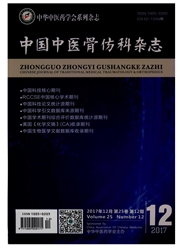

 中文摘要:
中文摘要:
目的 观察古方青娥丸对绝经后骨质疏松症患者血清β-链蛋白(β-catenin)和dickkopf-1(DKK-1)表达水平及骨矿密度(BMD)含量的影响,探讨该方治疗骨质疏松症的部分疗效机制。方法将80例绝经后骨质疏松患者随机分为治疗组及对照组,治疗组服用青娥丸(每次1丸,每日3次),对照组服用青娥丸模拟剂(每次1丸,每日3次),2组均治疗6个月。分别在治疗前、后检测患者BMD、血清β-catenin和DKK-1的表达水平。结果 2组治疗前后BMD无明显变化;治疗组血清β-catenin表达水平明显高于治疗前及对照组(P〈0.05);DKK-1水平明显低于治疗前及对照组(P〈0.05)。结论青娥丸能够维持绝经后骨质疏松患者的BMD,其部分疗效机制与其可增强患者β-catenin表达和抑制DKK-1水平有关。
 英文摘要:
英文摘要:
Objective To investigate the effects of Chinese herbal Qing'e pill on expression level of beta chain protein(β-catenin), dickkopf-1 (DKK-1) in the serum and bone mineral density(BMD) of patients with postmenopausal osteoporosis,and to explore underlying molecular mechanisms. Methods All 80 patients with postmenopausal osteoporosis were selected and randomly divided into Qing'e pill treatment group and placebo control group. The patients in both groups received treatment for 6 months. Respectively,before and after treatment, patients in both groups were detected in the serum of [3-catenin and DKK-1 level,dual energy X-ray absorptiometry(DEXA) deter- mination BMD in lumbar spine and hip. Results There was no significantly increased bone mineral density in both groups. In Qing'e Pill treatment group, the level of β-catenin was significantly increased and DKK-1 was decreased after 6 months (P〈0.05). Conclusion Qing'e pill is effective on maintaining BMD,might reduce metabolic bone loss inpostmenopausal women. The partial mechanism of treating postmenopausal osteoporosis with Qing'e pills is suggested that might increase the expression of β-catenin and inhibit level of DKK-1 in patients with postmenopausal osteoporosis.
 同期刊论文项目
同期刊论文项目
 同项目期刊论文
同项目期刊论文
 期刊信息
期刊信息
